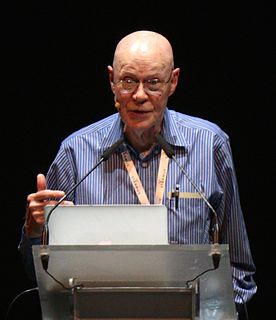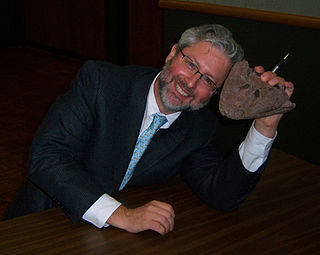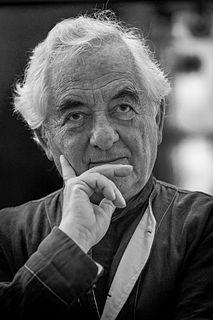A Quote by Jeanette Winterson
The fact is that every atom that we're made of is part of that first explosion of a nuclear star billions of years ago. We're connected to the entire universe.
Related Quotes
The atoms of our bodies are traceable to stars that manufactured them in their cores and exploded these enriched ingredients across our galaxy, billions of years ago. For this reason, we are biologically connected to every other living thing in the world. We are chemically connected to all molecules on Earth. And we are atomically connected to all atoms in the universe. We are not figuratively, but literally stardust.
There were timelines branching and branching, a mega-universe of universes, millions more every minute. Billions? Trillions? The universe split every time someone made a decision. Split, so that every decision ever made could go both ways. Every choice made by every man, woman, and child was reversed in the universe next door.
Radio Astronomy has added greatly to our understanding of the structure and dynamics of the universe. The cosmic microwave background radiation, considered a relic of the explosion at the beginning of the universe some 18 billion years ago, is one of the most powerful aids in determining these features of the universe.
Our entire universe emerged from a point smaller than a single atom. Space itself exploded in a cosmic fire, launching the expansion of the universe and giving birth to all the energy and all the matter we know today. I know that sounds crazy, but there’s strong observational evidence to support the Big Bang theory. And it includes the amount of helium in the cosmos and the glow of radio waves left over from the explosion.
He always reminded us that every atom in our bodies was once part of a distant star that had exploded. He talked about how evolution moves from simplicity toward complexity, and how human intelligence is the highest known expression of evolution. I remember him telling me that a frog's brain is much more complex than a star. He saw human consciousness as the first neuron of the universe coming to life and awareness. A spark in the darkness, waiting to spread to fire.
We might expect intelligent life and technological communities to have emerged in the universe billions of years ago. Given that human society is only a few thousand years old, and that human technological society is mere centuries old, the nature of a community with millions or even billions of years of technological and social progress cannot even be imagined. ... What would we make of a billion-year-old technological community?
I don't know if most people have truly taken on board what this says about our place in the natural world. It doesn't mean that humans are dominating the Earth, ruling over all of nature. In fact, it is a reminder that we are only a tiny part of nature, at the mercy of a system whose operations predate us by billions of years, and will continue billions of years after we're gone.
You are one miniscule piece of a never-ending cycle. In fact, you're not even a piece. You're just a holder for billions and billions of other pieces. Whether that's organic components, living organisms inside your body, bacteria or whatever it is, you're just part of the soup of the universe, so just try to enjoy what's good about it.
Each galaxy, star, or person is the temporary owner of particles that have passed through the births and deaths of entities across vast reaches of time and space. The particles that make us have traveled billions of years across the universe; long after we and our planet are gone, they will be a part of other worlds.
One [idea] was that the Universe started its life a finite time ago in a single huge explosion, and that the present expansion is a relic of the violence of this explosion. This big bang idea seemed to me to be unsatisfactory even before detailed examination showed that it leads to serious difficulties.
We are all connected to each other biologically, to the earth chemically and to the rest of the universe atomically. That's kinda cool! That makes me smile and I actually feel quite large at the end of that. It's not that we are better than the universe, we are part of the universe. We are in the universe and the universe is in us.
During the last 35 years, the artists multiplied, the public grew enormously, the economy exploded, and so-called contemporary art became fashionable. All these parameters changed the art world form its previous aspects and fundamentals - the explosion of museums and institutions, explosion of Biennales and Triennials, explosion of money, explosion of interest, explosion of artists, explosion of countries interested in contemporary exhibitions, explosion of the public. Not to see that is to be more than blind.




































